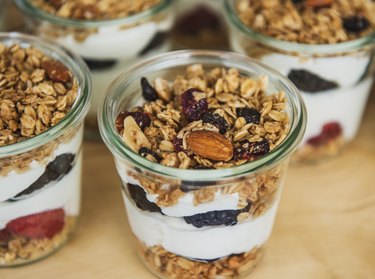
Whether you were refueling after a hot and sweaty workout or recovering after a night on the town, electrolytes — delivered via sports drink or powder packet — have probably revitalized you in some way in the past. You might know they're key to hydration, but have you ever wondered: What are electrolytes, exactly?
Here, we'll dig into what they are, why you need them and where to find them in your diet.
Video of the Day
Video of the Day
What Are Electrolytes?
Electrolytes are minerals that play a very important role in the body. These little guys supply an electrical current that helps control your heartbeat, coordinate muscle contraction and control the movement of water in the body, so fluids stay evenly distributed, per the University of Michigan Medical School. The minerals our body uses most are sodium, chloride, potassium, magnesium, phosphate and calcium.
What the sports drink manufacturers don't want you to know is that fresh, minimally processed food actually provides an abundance of electrolytes. Whole fruits, vegetables, legumes, meat, fish, nuts and seeds are all incredible sources of micronutrients, including the six main electrolytes.
Sodium and chloride are abundantly available in salt, according to the USDA's FoodData Central database, which is easy enough to add to most foods. And the other four minerals are also common in the diet.
- Calcium can be found in dairy products, almonds and dark green leafy vegetables.
- Potassium-rich foods include citrus, dairy, avocados, potatoes and tomatoes.
- Magnesium is abundant in dark chocolate and nuts.
- Phosphorous can be found in dairy products and cocoa.
How much of each electrolyte a person needs varies depending on a multitude of things, such as genes, activity level, drug or alcohol use, caffeine consumption, sweat loss and illness.
Eating electrolytes is kind of like paying your electricity bill. Consuming a diet rich in electrolytes ensures that you'll supply a steady current of electricity to keep your heartbeat in rhythm and your muscles contracting comfortably without any cramping.
So, What Do Electrolytes Do?
Our bodies store electrolytes in one of three places: inside the cells, outside the cells or in the blood. Having these minerals in various storage helps the body evenly distribute water, to control bloating and fluid retention. Much like Goldilocks, our bodies want our electrolyte balance to be "just right." Too much salt or too little salt, for example, can cause bloating as our body struggles to find balance.
When electrolytes are dissolved in the blood, they are able to conduct electricity. These charges create electrical impulses to control many functions in the body, such as "firing" electricity to contract your muscles, control your heart's rhythm and regulate the function of nerve cells.
Eating electrolytes is kind of like paying your electricity bill. Consuming a diet rich in electrolytes ensures that you'll supply a steady current of electricity to keep your heartbeat in rhythm and your muscles contracting comfortably without any cramping. Much like not paying your electricity bill will lead to a dim house without lights, skimping on electrolytes in the diet will disrupt the electrical impulses of your cells, which could potentially lead to muscle cramping or a heart arrythmia. According to the Mayo Clinic, the risks of a heart beating out of sync include stroke and heart failure.
How We Lose Electrolytes
How and how quickly your body loses electrolytes varies from person to person. Unfortunately, it's quite easy to lose electrolytes. We surrender these minerals when we sweat, urinate, defecate or become dehydrated from alcohol, caffeine or diuretics.
If you're losing electrolytes too quickly because of diarrhea or because of extreme physical activity, it may be a good idea to use a sports beverage to quickly replenish your electrolyte levels. Otherwise, you'll most likely get an adequate amount from a healthy diet.
Electrolytes and Exercise
Athletes and those who exercise regularly need to be especially conscious of how their bodies use and lose electrolytes.
According to the September 2015 issue of the British Journal of Sports Medicine, as we up our level of physical activity, our bodies become more efficient at producing sweat to cool us down during exercise. Meanwhile, our sweat glands actually become better at resorbing sodium and chloride to try and preserve electrolytes. However, the rate of electrolyte loss usually exceeds our body's ability to reabsorb.
So what does that all mean? Basically, sweaty athletes — especially those who regularly exercise for over an hour in hot or humid conditions — have electrolyte needs that are likely higher than the average person's, so they need to replenish these minerals with a carefully balanced diet or a sports drink.
To optimize hydration, athletes should pre-hydrate, meaning they should drink plenty of water before their workout. Drink enough to prevent thirst and to produce urine that looks like light-colored lemonade. If your workout lasts longer than 60 minutes, an electrolyte replacement beverage during or after is helpful to rehydrate and rebalance lost electrolytes.
The biggest barrier to sports drink consumption is the concern that sports drinks contain sugar. As noted in the September 2015 issue of Nutrition Reviews, though, sugar actually helps the small intestine absorb electrolytes quickly and without intolerance. Also, athletes exercising for greater than an hour can benefit from the additional calories from sugar to speed recovery and fuel hungry muscles.
Just be aware that the calories in sports drinks still count as calories, and it may be a good idea to have less carbohydrates — say, from pasta or rice — on your post-workout plate to balance the calories from your sports drink.
And remember, athletes training for less than 60 minutes likely do not need a sports drink for adequate electrolyte replenishment.

Electrolyte-Packed Snacks
It's easy to lose electrolytes through sweat, defecation or urine, but it's also easy to meet our electrolyte needs from our diet. After all, before sports drinks existed, humankind was able to adequately replenish electrolyte losses from diet alone.
While electrolyte repletion beverages have a time and place, there are plenty of yummy snacks you can create to naturally replace electrolytes. Here are a few ideas:
- Try blending a banana with a pinch of salt in some coconut milk and dark chocolate to replenish potassium, calcium, magnesium, phosphorous and sodium chloride.
- A Greek yogurt topped with almonds, berries and coconut flakes will refuel your body with potassium, magnesium and phosphorous.
- Dipping broccoli, carrots and sliced cucumbers in hummus will give your body lots of phosphorous, potassium, sodium, magnesium and calcium.
- University of Michigan Medical School: "Electrolyte Panel"
- USDA FoodData Central
- Mayo Clinic: "Heart arrhythmia"
- British Journal of Sports Medicine: "Consensus recommendations on training and competing in the heat"
- Nutrition Reviews: "Fate of ingested fluids: factors affecting gastric emptying and intestinal absorption of beverages in humans"
Was this article helpful?
150 Characters Max
0/150
Thank you for sharing!
Thank you for your feedback!